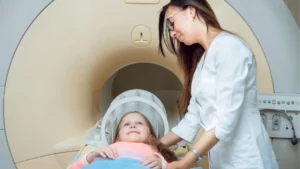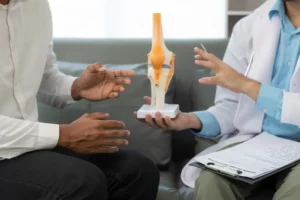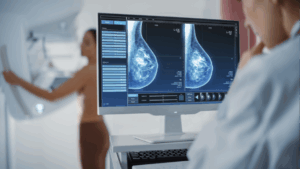If you’re scheduled for an MRI with contrast, you wonder why you have to fast beforehand. Fasting before an MRI with contrast is important for a number of reasons.
If you are getting an MRI with contrast soon and you’re not sure why fasting is needed, this article will enlighten you. MRI with contrast can help doctors better visualize certain areas in your body and detect abnormalities. The contrast dye helps make these areas more visible on the MRI scan.
What is an MRI with Contrast?
An MRI with contrast is a type of MRI scan that uses a contrast dye to visualize certain body areas better. The contrast dye helps make these areas more visible on the MRI scan.
The contrast dye is usually injected into a vein in your arm before the MRI scan. The dye contains gadolinium, which is a paramagnetic metal that helps increase the visibility of certain tissues in the body.
Who Needs an MRI with Contrast?
Typically, people who need an MRI with contrast are those who have had a previous MRI scan that did not provide enough information for the doctor.
An MRI with contrast can also be helpful for people who have certain medical conditions, such as:
- Cancer
- Multiple sclerosis
- Infections
- Inflammatory diseases
- Heart disease
Uses of an MRI with Contrast
There can be tons of uses an MRI with contrast can have, but these three are the most common:
Assessing MS
When it comes to assessing the damage caused by MS, an MRI with contrast is often used. This type of scan can help show if lesions have grown or changed since the last MRI scan.
Cancer Diagnosis
An MRI with contrast can be used to detect cancer, especially in its early stages. The gadolinium in the contrast dye helps highlight cancerous cells, making them easier to spot on the MRI scan.
Image Clarity
Lastly, an MRI with contrast can provide clearer images than a regular MRI scan. This is especially helpful in areas that are difficult to image, such as the spine.
How an MRI with Contrast Is Performed
When doctors need to use an MRI with contrast, two steps are performed: before the examination and after the test.
Before the Examination
Before the MRI test, you will go through a 3-step test: pre-test, throughout the test, and post-test.
Pre-test
The first thing that will happen is the pre-test. In this step, a staff member will review your medical history with you and ask about any allergies.
They will also ask if you have ever had a reaction to contrast dye or if you are pregnant. It’s important to tell the staff about any medical conditions you have and any medications you are taking.
You will also be asked to sign a consent form that gives the staff permission to perform the MRI with contrast.
Throughout the Test
Once everything is set up, you will be asked to lie down on the MRI machine. A staff member will stay in the room with you throughout the test and will give you instructions on how to stay still.
The machine will make loud noises as it takes pictures of your body. You may be given earplugs or headphones to help block out the noise.
The MRI scan itself only takes about 30 minutes, but the entire process, from start to finish, can take up to an hour.
Post-test
After the MRI with contrast is complete, you will be asked to wait in the waiting room for 30 minutes. This is to make sure you don’t have any adverse reactions to the contrast dye.
If you do have a reaction, the staff will be able to treat it immediately. Once the 30 minutes is up, you will be free to go home.
After the Test
After you’ve gone home, there are a few things you should do:
- Drink lots of water. It’s important to drink lots of water after the MRI with contrast. This helps flush the gadolinium out of your system.
- Watch for reactions. Gadolinium is safe for most people, but a small number of people may have an allergic reaction to it. Watch for signs of a reaction, such as hives, itching, or swelling.
- Call your doctor. If you have any concerns or questions after the MRI with contrast, be sure to call your doctor. They will be able to help you and answer any questions you may have.
Advantages of Contrast in MRIs
Many advantages come with using contrast in MRIs.
These include:
- They provide more information. Contrasts help highlight certain areas on the MRI, which can provide more information for the doctor.
- They can be used to diagnose conditions. Contrasts can be used to diagnose conditions such as cancer, MS, and heart disease.
- They can provide clearer images. Contrasts can also provide clearer images than regular MRIs. This is especially helpful in areas that are difficult to image, such as the spine.
- They are safe. Contrasts are generally safe for most people. There are some risks involved, but these are usually minor and can be treated easily.
What’s Involved with Contrast Injection?
Contrast injection is a simple process that involves injecting a contrast agent into your body through an IV.
The contrast agent is usually gadolinium-based and is injected into your arm. It then travels through your body and helps highlight certain areas on the MRI scan.
Contrast injection is a quick and easy procedure that is generally well tolerated by most people. Some risks are involved, but these are usually minor and can be treated easily.
Potential Safety Concerns of MRI Contrast
Although MRI with contrast is generally safe, some potential risks are involved.
These include:
Side effects
Many people may have an allergic reaction to the contrast agent. Symptoms of an allergic reaction include hives, itching, and swelling.
Kidney problems
People with kidney problems may risk more serious side effects from contrast agents. This is because the contrast agent can build up in the body and cause problems.
Joint irritation and inflammation
People with joint problems may risk irritation and inflammation from the contrast agent. This is because the contrast agent can build up joints and cause problems.
What the FDA Has to Say
According to the FDA, gadolinium-based contrast agents are safe for most people. However, some potential risks are involved.
These include:
- Allergic reactions
- Kidney problems
- Joint irritation and inflammation
If you have any concerns or questions about MRI with contrast, be sure to talk to your doctor. They will be able to help you and answer any questions you may have. We at One Step Diagnostic have ample experience with MRI and can guide you through this process. Schedule an appointment today.
Why do you have to fast before MRI With Contrast?
The top reason why fasting is required prior to an MRI with contrast is for safety reasons. When you are fasting, your stomach is empty, which reduces the risk of vomiting and aspirating (breathing in) stomach contents during the exam.
Such other reasons are:
Ultrasound
Fasting before an ultrasound is done to help ensure that the bowel is empty. This is important because gas and stool can obscure the view of organs and structures being examined.
Contrast-Enhanced CT and MRI
Contrast material is often used during a CT or MRI to help enhance the visibility of certain structures or abnormalities. When contrast material is injected into a vein, it can sometimes cause nausea and vomiting. Fasting before the exam may help reduce this risk.
How long do you have to fast before MRI with contrast?
The length of time you need to fast prior to your exam will depend on the type of exam you are having. For most exams, you will be asked to fast for 4-6 hours before the exam.
However, if you have a contrast-enhanced CT or MRI, you may be asked to fast for 8 hours.
How long does an MRI with contrast take?
The length of time an MRI with contrast will depend on the type of exam you are having. Most exams take 30-60 minutes. However, some exams may take longer.
If you have any questions about fasting or the length of your exam, be sure to talk to your doctor or the technologist performing your exam.
Tips for Preparing for an MRI with Contrast
If you are scheduled for an MRI with contrast, there are a few things you can do to prepare.
These include:
- Drink your fluids.
- Get enough sleep
- Talk to your doctor about your options.
- Arrive early for your appointment.
- Remove any metallic items.
- Relax and be calm.
An MRI with contrast is not something to be scared of. All you need to do is be prepared and know what to expect. We at One Step Diagnostic are here to help you through this process. Schedule an appointment today.
Get an MRI with Contrast Today!
An MRI with contrast can surely help your doctor better understand what is going on inside your body. If you are scheduled for an MRI with contrast, or think you may need one, be sure to contact us today.
We at One Step Diagnostic would be more than happy to help you through this process. Our professionals have years of experience and are here to answer any questions you may have. Schedule an appointment today!




